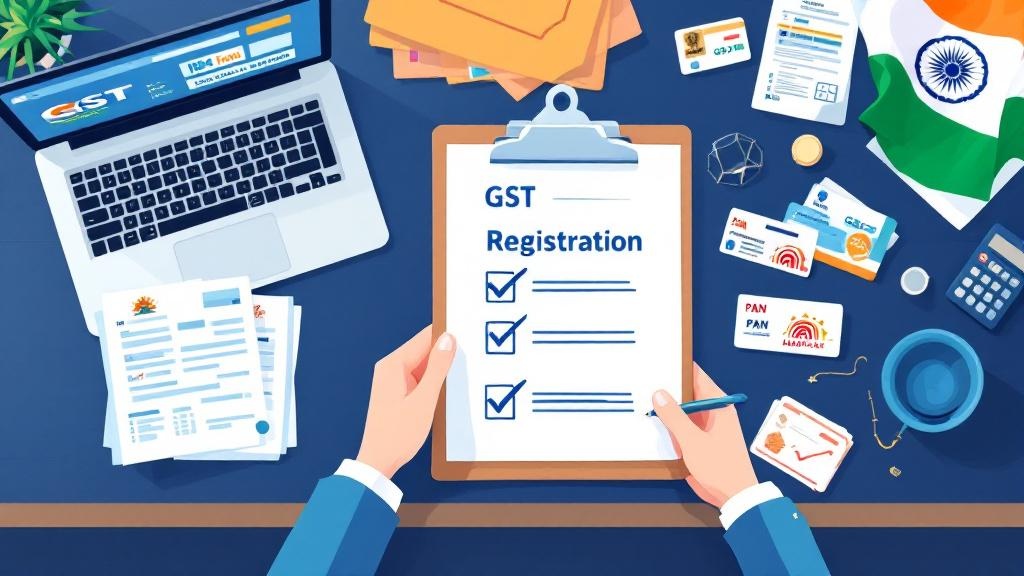If you’re a seller on Shopify or Meesho, chances are you’ve heard about GST registration. But what exactly is it, and why is it essential for online sellers like you? Whether you’re just starting your online business or looking to scale, understanding Goods and Services Tax (GST) is crucial to staying compliant and unlocking growth opportunities.
In this guide, we’ll break down everything you need to know about GST registration for Shopify and Meesho sellers, explain how to get registered easily, and highlight why getting it right from the beginning can save you a lot of hassle in the future.
What is GST and Why Is It Important for Online Sellers?
GST (Goods and Services Tax) is a comprehensive indirect tax levied on the manufacture, sale, and consumption of goods and services across India. Introduced in 2017, it replaced multiple indirect taxes to create a unified tax structure.
If you’re selling products through platforms like Shopify or Meesho, GST isn’t optional — it’s mandatory if your business crosses certain thresholds or if you’re using e-commerce platforms to sell.
Here’s why GST matters:
-
It’s legally required for e-commerce sellers.
-
It enables input tax credit, reducing your overall tax liability.
-
You can’t operate fully on Shopify or Meesho without it.
-
It builds credibility with customers and suppliers.
You can read more about GST and register easily through Fintax24’s GST registration services, which offers step-by-step guidance tailored for online sellers.
Who Needs GST Registration?
Let’s clear up a common confusion — not all sellers need to register for GST, but many do. Here’s when you must register:
1. Selling Through E-commerce Platforms
If you’re selling on Meesho, Shopify, Amazon, Flipkart, or any other online marketplace, GST registration is mandatory, regardless of your turnover.
2. Turnover-Based Requirement
If your annual turnover exceeds ₹40 lakhs (₹20 lakhs for service providers and certain special category states), you’re required to register under GST even if you’re not using an online platform.
3. Inter-State Sales
If you’re selling products to customers in different states, GST registration becomes necessary to comply with inter-state supply rules.
4. Voluntary Registration
Even if you’re not required to register, voluntary registration can help with input tax credit, improved brand image, and ease of doing business.
GST Requirements on Shopify and Meesho
Each platform has specific compliance rules:
✅ Shopify Sellers
Shopify is a DIY e-commerce platform that lets you set up your own store. While Shopify itself doesn’t mandate GST registration, if you’re:
-
Selling in multiple Indian states,
-
Earning above the threshold,
-
Or importing/exporting products,
Then you must have a valid GSTIN (GST Identification Number). Moreover, Shopify’s payment gateways and delivery partners often ask for your GST details to process transactions smoothly.
✅ Meesho Sellers
Meesho, unlike Shopify, requires GST registration for all sellers who list their products. While they did allow non-GST sellers temporarily for reselling, they now mandate GSTIN for both new and existing suppliers.
You’ll also need to:
-
Submit your GST certificate,
-
File regular GST returns,
-
Maintain GST-compliant invoices.
Documents Required for GST Registration
Getting started with GST registration isn’t as difficult as it seems. Here’s a checklist of commonly required documents:
-
PAN card of the business or individual
-
Aadhaar card
-
Proof of business registration (if applicable)
-
Bank account details
-
Proof of business address (utility bill, rent agreement, etc.)
-
Passport-size photograph
Make sure the documents are accurate and up-to-date to avoid delays.
How to Register for GST: A Step-by-Step Guide
While you can register for GST directly on the GST Portal, the process can be a bit tricky if you’re not familiar with taxation terms. Here’s a simplified breakdown:
Step 1: Visit the GST Portal
Go to the official portal and click on “Register Now” under the “Taxpayers” tab.
Step 2: Fill Out Part A of the Form
Provide details like:
-
Legal name of the business
-
PAN number
-
Mobile number and email (you’ll receive OTPs)
Step 3: Complete Part B
Once your details are verified, fill out the remaining form with your business information and upload necessary documents.
Step 4: ARN Generation
After submission, you’ll receive an Application Reference Number (ARN) to track your application.
Step 5: GSTIN Issued
Upon successful verification, you’ll receive your GSTIN and GST certificate.
Need help? Services like Fintax24’s GST Registration Assistance streamline the process, offering expert support so you don’t have to worry about mistakes or missed steps.
GST Returns and Compliance: What to Expect After Registration
Once you’ve registered, the work isn’t over. You’ll need to maintain compliance by filing monthly or quarterly returns, depending on your turnover.
Common GST Returns:
-
GSTR-1: Details of outward supplies (sales)
-
GSTR-3B: Summary return for tax payment
-
GSTR-9: Annual return
Missing deadlines can lead to penalties and interest charges, so set reminders or consider hiring a tax consultant.
Pro Tip: Many Shopify sellers use automated GST invoicing tools to stay compliant, while Meesho sellers should keep a regular tab on their seller dashboard notifications for compliance reminders.
Common Challenges Faced by Shopify and Meesho Sellers
Even seasoned sellers can run into compliance hiccups. Here are a few you should watch out for:
❌ GST Number Mismatch
Always double-check that your business name and PAN match your GST records to avoid registration rejection.
❌ Filing Errors
Incorrect GSTR filings can lead to legal issues and ITC (Input Tax Credit) blockage.
❌ Inactive GSTIN
Failing to file returns on time can cause your GSTIN to be marked inactive. Re-activating it can be a painful process.
✅ Solution: Use Professional Help
Platforms like Fintax24 are tailored to help small business owners and online sellers get registered and remain compliant without getting bogged down in tax jargon.
Benefits of GST Registration for Online Sellers
Still wondering if GST registration is worth it? Here’s what you gain:
-
Access to broader markets – No restrictions on interstate sales.
-
Eligibility to list on major platforms – Amazon, Flipkart, Meesho, etc.
-
Claim Input Tax Credit – Save money on business expenses.
-
Professional brand image – A registered business builds trust.
-
Legal protection – Helps avoid unnecessary fines and legal trouble.
Final Thoughts
Whether you’re an aspiring entrepreneur on Shopify or a growing seller on Meesho, GST registration is not just a compliance checkbox — it’s a strategic move. It keeps your business legal, expands your market access, and helps you build a reputable brand in the e-commerce space.
The process might seem intimidating at first, but with the right help, it’s straightforward and stress-free. If you’d rather not deal with paperwork and portal confusion, expert platforms like Fintax24 GST Registration Services offer end-to-end assistance for online sellers.
Take the first step toward a compliant, scalable e-commerce business — get your GST sorted today!






Comments (0)